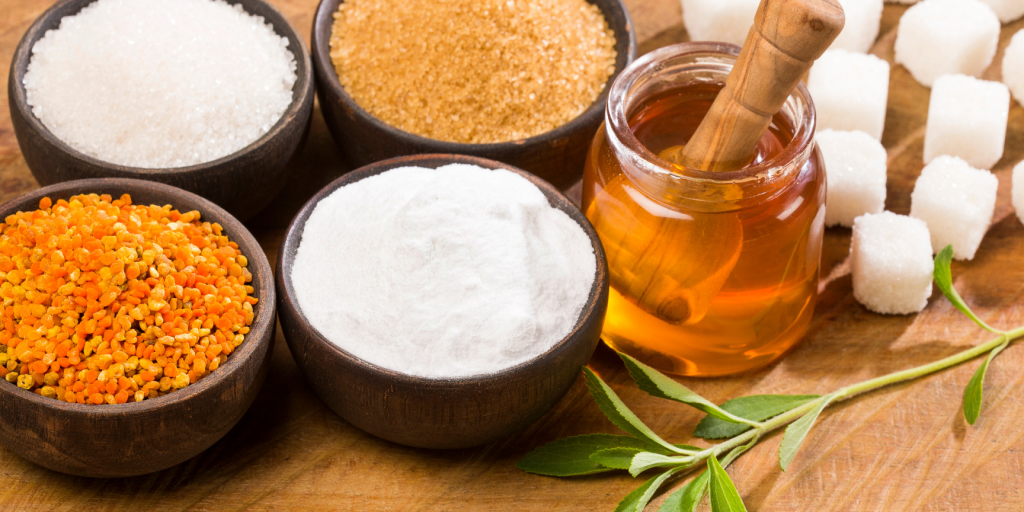Sweeteners – what should you know about them?

What are sweeteners? Why are they used? Learn about the characteristics of popular sweeteners and check whether their use is safe.
Sweeteners are substances that replace sugar. Their calorie content is lower than sugar. Their use is widespread, often found in “0” type drinks and products labeled as “no added sugar.”
Why use sweeteners?
The reasons for using sweeteners vary. More and more people choose them because of lifestyle or health concerns.
Low calorie content
Sweeteners are an alternative to sugar. Their biggest advantage is their low calorie content. Today, the number of people who are overweight or obese continues to rise. Any idea that helps reduce calorie intake is of great interest. For this reason, sweeteners have been studied for years, both in terms of taste satisfaction and safety. Food manufacturers began producing sugar-free products to reduce calorie intake while still keeping them sweet. Sweeteners are therefore mainly used to lower calorie consumption and reduce sugar intake.
Low-carbohydrate diets
Sweeteners and products containing them are popular among people on ketogenic and low-carb diets. These diets are designed to limit carbohydrate intake, including sugars. Sweeteners that do not affect blood glucose levels include erythritol, stevia, and xylitol. These substances do not interfere with maintaining ketosis. For this reason, you will often find them on the labels of products marketed as keto.
Diabetes
Sweeteners have long been used in foods for diabetics. These substances cannot affect glucose levels because people with diabetes have impaired glucose tolerance. Sweeteners replace sugar in coffee or tea and are also found in sweets and other foods.
Popular sweeteners
You can increasingly find sweeteners in discount stores and small shops. But which one to choose? Different groups of sweeteners vary in sweetness and calorie content. They also differ in their applications—not all of them can be heated.
Polyols
Polyols are molecules that resemble alcohols in structure, sometimes referred to as sugar alcohols. Leading representatives of this group are erythritol and xylitol. These compounds have fewer calories than sugar. On average, they provide about 2.5 kcal per gram. However, excessive consumption can upset the intestines and have a laxative effect. Polyols do not cause tooth decay and are used as sweetening agents in chewing gums.
Erythritol provides virtually no calories because it is not digested in the body. It can be used in cakes, desserts, and as a drink sweetener. Research has shown that it may positively affect cardiovascular health by lowering blood pressure. Its sweetness is slightly less than that of sucrose, or regular sugar.
Xylitol, also known as birch sugar, contains 2.4 kcal per gram. It is less sweet than sugar but sweeter than erythritol. It leaves a cooling sensation in the mouth. Suitable for baking, both cold and hot desserts, and as a sweetener. However, excessive intake can have a laxative effect.
Other sweeteners used in “0” type drinks and sugar-free products include isomalt, sorbitol, and mannitol. Their calorie content ranges from 1.5 to 3 kcal per gram. Their sweetness is lower than sugar. They are often added to ice cream, protein bars, or cookies.
Stevia
A natural sweetener, about 300 times sweeter than regular sugar. Only a very small amount is needed to sweeten foods, which means it contains no calories. Stevia can be used for baking, cooking, and cold applications. Its taste is considered controversial because it has a licorice-like aftertaste. It lowers glucose levels and supports blood pressure control. Stevia does not cause tooth decay.
Aspartame
An artificial sweetener about 200 times sweeter than sugar. Because of its high sweetening power, it is calorie-free. Aspartame is the most thoroughly studied sweetener. According to current knowledge, if the acceptable daily intake of 40 mg is not exceeded, it is safe. Aspartame is unsuitable for baking and cooking because it loses sweetness at high temperatures. People with phenylketonuria cannot consume aspartame because it is a source of phenylalanine.
Acesulfame K
Like aspartame, acesulfame K is an artificial, intensely sweet, calorie-free sweetener. Unlike aspartame, it can be used in baking and cooking. It is also safe for people with phenylketonuria. Research shows it is safe, with an acceptable daily intake of 15 mg/kg of body weight. Since the amounts present in foods are very low, it is difficult to exceed this limit.
Other sweetening substances
Other artificial sweeteners include sucralose, saccharin, cyclamic acid, and neohesperidin DC. All of them are intensely sweet. Sucralose itself is not harmful, but it breaks down into compounds (chloroglucose and chlorofructose) that are harmful in large quantities. However, such amounts cannot be reached through food. All approved sweeteners have been tested and are considered safe.
Natural sweetening substances
Natural sweeteners include honey, maple syrup, agave nectar, molasses, and fruit juice concentrates. These products provide more vitamins and minerals than white sugar, which is refined and provides only sugar. However, they are also high in calories and sugar. In practice, it makes no difference which of these substances is used—they should all be treated the same as sugar. In the case of fruit juices, the sugar provided is fructose. It is absorbed into the bloodstream faster than sucrose, leading to a quicker insulin spike. For this reason, fruit juices are not recommended, especially for people with impaired carbohydrate metabolism. Excess sugar in the diet contributes to carbohydrate metabolism disorders, obesity, and other metabolic problems.
Side effects of sweeteners
Excessive intake of polyols, especially in people with IBS and/or SIBO, can cause stomach upset and intestinal problems leading to diarrhea. The effects of sweeteners on gut microbiota are not fully understood. Artificial sweeteners are foreign substances to our intestines. Overconsumption may be one of the factors contributing to gut dysbiosis.
Fitatu® Support Group
Reaching your goal is easier with the support of others! Join our Fitatu Facebook group and achieve your goals together with other Fitatu® app users. With the group members, you can share your results every day and motivate each other to keep going.

Fitatu® App
Download the app from the Google Play Store or Apple Store and start tracking your macros with us!
Prefer the web version? No problem. A basic web version is available for our subscribers.
What else is included in Fitatu® Premium?
- over 2000 recipes, plus dozens of new ones every month,
- additional intermittent fasting plans,
- the ability to create shopping lists,
- 7 ready-made meal plans,
- filtering products and recipes,
- more sync options with fitness apps,
- access to the web version of the app,
- no ads!
Bibliography:
- Bast A. i wsp.:Use of erythritol for the prevention or treatment of hypertension. EP2459507 A1. (2012)
- https://dietetycy.org.pl/poliole-slodycz-bez-wyrzeczen/
- https://dietetycy.org.pl/stewia-cos-wiecej-niz-slodzik/
- https://www.mp.pl/pacjent/dieta/zasady/63310,slodziki-czy-sa-bezpieczne#:~:text=S%C4%85%20to%20m.in.,neohesperydyna%20DC%2C%20sukraloza%2C%20neotam.
- https://dietetycy.org.pl/acesulfam-k/
- http://www.fao.org/tempref/codex/Meetings/CCFAC/ccfac31/INS_e.pdf
- https://www.fao.org/gsfaonline/additives/details.html?id=137&d-3586470-s=2&d-3586470-o=2&lang=





